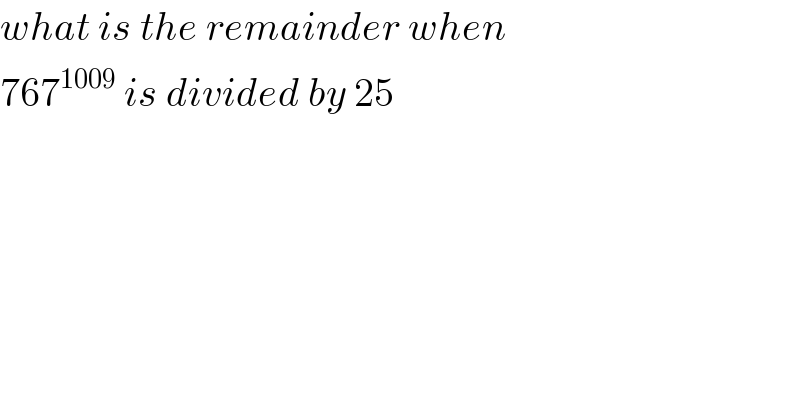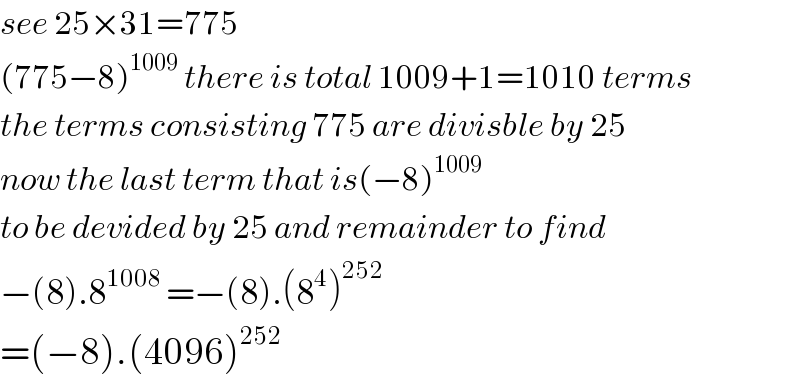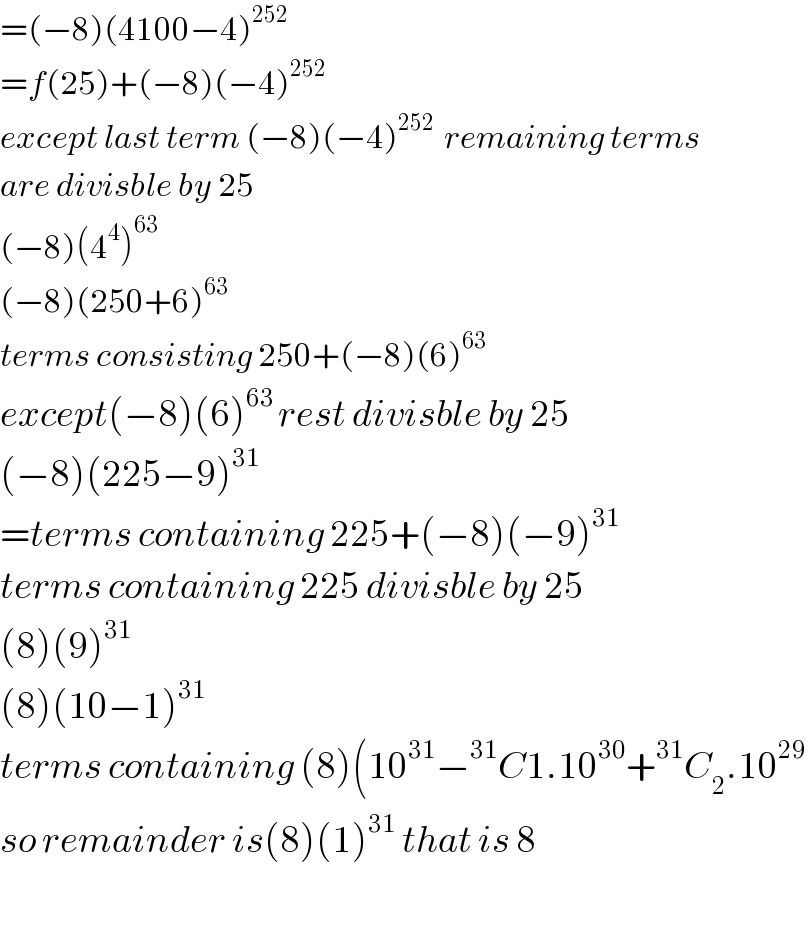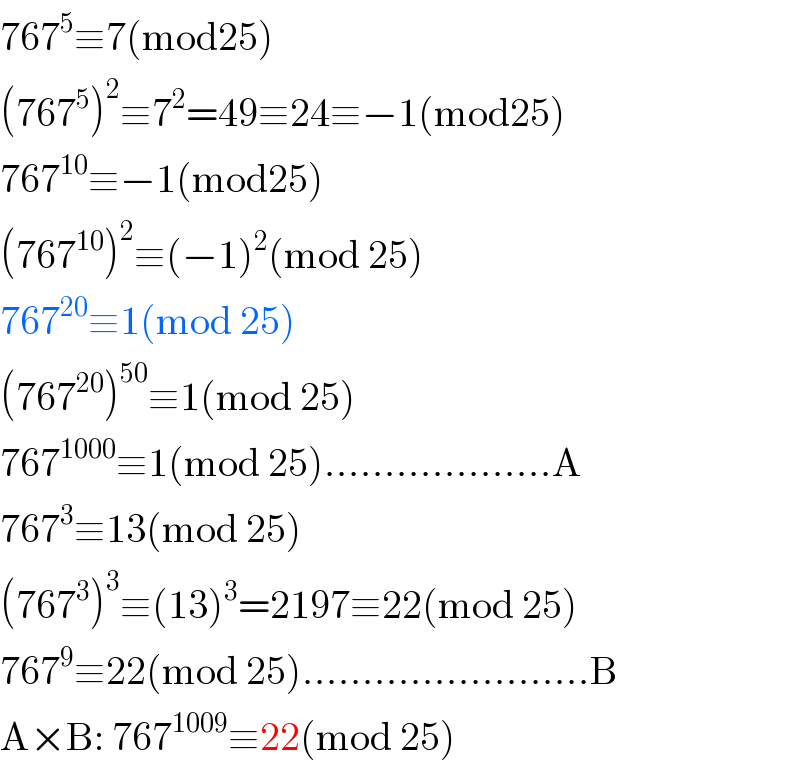Question Number 34140 by NECx last updated on 01/May/18

$${what}\:{is}\:{the}\:{remainder}\:{when} \\ $$$$\mathrm{767}^{\mathrm{1009}} \:{is}\:{divided}\:{by}\:\mathrm{25} \\ $$
Answered by tanmay.chaudhury50@gmail.com last updated on 01/May/18

$${see}\:\mathrm{25}×\mathrm{31}=\mathrm{775} \\ $$$$\left(\mathrm{775}−\mathrm{8}\right)^{\mathrm{1009}} \:{there}\:{is}\:{total}\:\mathrm{1009}+\mathrm{1}=\mathrm{1010}\:{terms} \\ $$$${the}\:{terms}\:{consisting}\:\mathrm{775}\:{are}\:{divisble}\:{by}\:\mathrm{25} \\ $$$${now}\:{the}\:{last}\:{term}\:{that}\:{is}\left(−\mathrm{8}\right)^{\mathrm{1009}\:\:} \\ $$$${to}\:{be}\:{devided}\:{by}\:\mathrm{25}\:{and}\:{remainder}\:{to}\:{find} \\ $$$$−\left(\mathrm{8}\right).\mathrm{8}^{\mathrm{1008}\:} =−\left(\mathrm{8}\right).\left(\mathrm{8}^{\mathrm{4}} \right)^{\mathrm{252}} \\ $$$$=\left(−\mathrm{8}\right).\left(\mathrm{4096}\right)^{\mathrm{252}} \:\:\: \\ $$
Commented by tanmay.chaudhury50@gmail.com last updated on 01/May/18

$$=\left(−\mathrm{8}\right)\left(\mathrm{4100}−\mathrm{4}\right)^{\mathrm{252}} \\ $$$$={f}\left(\mathrm{25}\right)+\left(−\mathrm{8}\right)\left(−\mathrm{4}\right)^{\mathrm{252}} \\ $$$${except}\:{last}\:{term}\:\left(−\mathrm{8}\right)\left(−\mathrm{4}\right)^{\mathrm{252}\:} \:{remaining}\:{terms} \\ $$$${are}\:{divisble}\:{by}\:\mathrm{25} \\ $$$$\left(−\mathrm{8}\right)\left(\mathrm{4}^{\mathrm{4}} \right)^{\mathrm{63}} \\ $$$$\left(−\mathrm{8}\right)\left(\mathrm{250}+\mathrm{6}\right)^{\mathrm{63}} \\ $$$${terms}\:{consisting}\:\mathrm{250}+\left(−\mathrm{8}\right)\left(\mathrm{6}\right)^{\mathrm{63}} \\ $$$${except}\left(−\mathrm{8}\right)\left(\mathrm{6}\right)^{\mathrm{63}\:} {rest}\:{divisble}\:{by}\:\mathrm{25} \\ $$$$\left(−\mathrm{8}\right)\left(\mathrm{225}−\mathrm{9}\right)^{\mathrm{31}} \\ $$$$={terms}\:{containing}\:\mathrm{225}+\left(−\mathrm{8}\right)\left(−\mathrm{9}\right)^{\mathrm{31}} \\ $$$${terms}\:{containing}\:\mathrm{225}\:{divisble}\:{by}\:\mathrm{25} \\ $$$$\left(\mathrm{8}\right)\left(\mathrm{9}\right)^{\mathrm{31}} \\ $$$$\left(\mathrm{8}\right)\left(\mathrm{10}−\mathrm{1}\right)^{\mathrm{31}} \\ $$$${terms}\:{containing}\:\left(\mathrm{8}\right)\left(\mathrm{10}^{\mathrm{31}} −^{\mathrm{31}} {C}\mathrm{1}.\mathrm{10}^{\mathrm{30}} +^{\mathrm{31}} {C}_{\mathrm{2}} .\mathrm{10}^{\mathrm{29}} \right. \\ $$$${so}\:{remainder}\:{is}\left(\mathrm{8}\right)\left(\mathrm{1}\right)^{\mathrm{31}} \:{that}\:{is}\:\mathrm{8} \\ $$$$ \\ $$
Answered by Rasheed.Sindhi last updated on 04/May/18

$$\mathrm{767}^{\mathrm{5}} \equiv\mathrm{7}\left(\mathrm{mod25}\right) \\ $$$$\left(\mathrm{767}^{\mathrm{5}} \right)^{\mathrm{2}} \equiv\mathrm{7}^{\mathrm{2}} =\mathrm{49}\equiv\mathrm{24}\equiv−\mathrm{1}\left(\mathrm{mod25}\right) \\ $$$$\mathrm{767}^{\mathrm{10}} \equiv−\mathrm{1}\left(\mathrm{mod25}\right) \\ $$$$\left(\mathrm{767}^{\mathrm{10}} \right)^{\mathrm{2}} \equiv\left(−\mathrm{1}\right)^{\mathrm{2}} \left(\mathrm{mod}\:\mathrm{25}\right) \\ $$$$\mathrm{767}^{\mathrm{20}} \equiv\mathrm{1}\left(\mathrm{mod}\:\mathrm{25}\right) \\ $$$$\left(\mathrm{767}^{\mathrm{20}} \right)^{\mathrm{50}} \equiv\mathrm{1}\left(\mathrm{mod}\:\mathrm{25}\right) \\ $$$$\mathrm{767}^{\mathrm{1000}} \equiv\mathrm{1}\left(\mathrm{mod}\:\mathrm{25}\right)……………….\mathrm{A} \\ $$$$\mathrm{767}^{\mathrm{3}} \equiv\mathrm{13}\left(\mathrm{mod}\:\mathrm{25}\right) \\ $$$$\left(\mathrm{767}^{\mathrm{3}} \right)^{\mathrm{3}} \equiv\left(\mathrm{13}\right)^{\mathrm{3}} =\mathrm{2197}\equiv\mathrm{22}\left(\mathrm{mod}\:\mathrm{25}\right) \\ $$$$\mathrm{767}^{\mathrm{9}} \equiv\mathrm{22}\left(\mathrm{mod}\:\mathrm{25}\right)……………………\mathrm{B} \\ $$$$\mathrm{A}×\mathrm{B}:\:\mathrm{767}^{\mathrm{1009}} \equiv\mathrm{22}\left(\mathrm{mod}\:\mathrm{25}\right) \\ $$
Commented by Rasheed.Sindhi last updated on 09/May/18

$$\mathrm{Mr}\:\mathrm{NECx}\:\mathrm{pl}\:\mathrm{confirm}\:\mathrm{that}\:\mathrm{the}\:\mathrm{answer} \\ $$$$\mathrm{is}\:\mathrm{correct}\:\mathrm{or}\:\mathrm{not}. \\ $$
